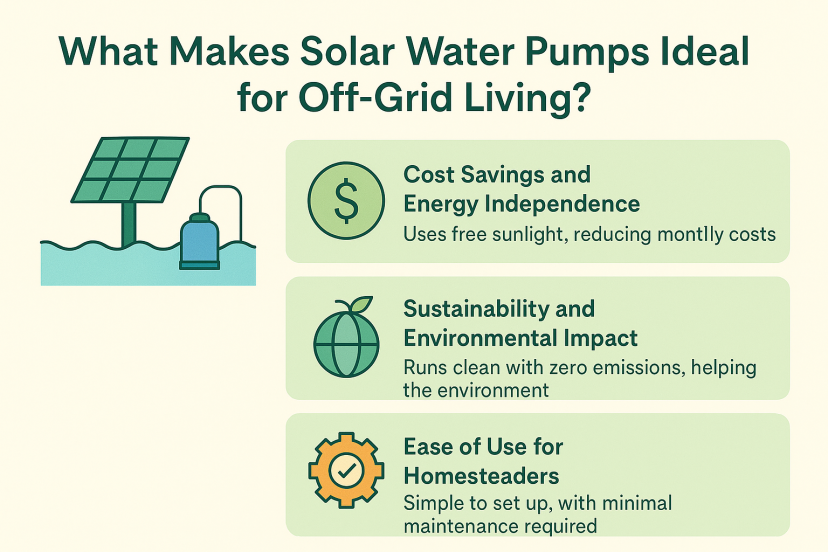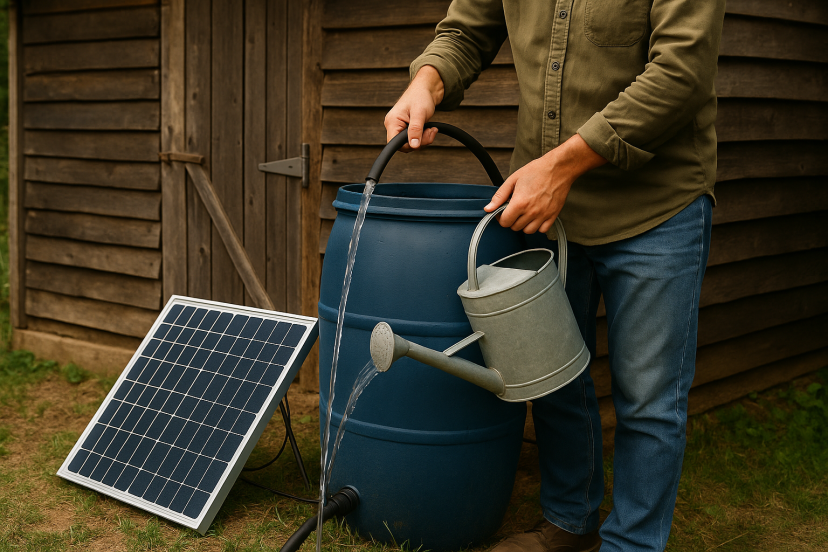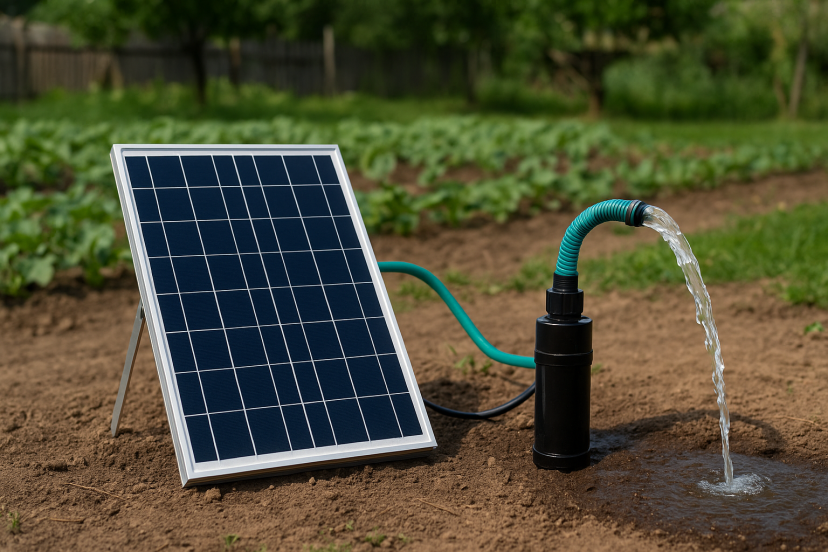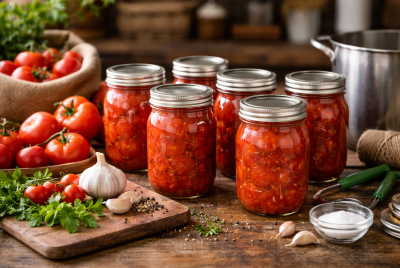5 Solar Water Pumps for Off-Grid Gardens
We may earn a commission for purchases made using our links. Please see our disclosure to learn more.
Water keeps every garden alive, right? But if you’re living off-grid, getting a steady supply can be a challenge. Plugging into the grid defeats the purpose of independence, and gas-powered pumps drain your wallet while adding to pollution. It’s no wonder so many homesteaders find themselves searching for a smarter way forward. That’s where solar water pumps shine—literally. Powered by free sunlight, they’re simple to maintain, gentle on the planet, and budget-friendly in the long run. For anyone chasing self-sufficiency, they turn the chore of watering into something far easier and more sustainable.
What Makes Solar Water Pumps Ideal for Off-Grid Living?
Cost Savings and Energy Independence
Monthly expenses for ordinary electric pumps mount up quickly. The expenses may eventually outweigh the advantages of a flourishing garden. In contrast, solar water pumps use the sun’s energy for free every time. After installation, they function on their own and provide long-term savings, freeing up funds for other homestead need.
A report from the National Renewable Energy Laboratory (NREL) estimates that switching to solar pumping systems can save farmers up to 40% in irrigation costs annually Renewable Energy for Water Pumping Applications in Rural Villages (2003). For off-grid gardeners, this shift means peace of mind knowing their crops and livestock are watered without draining their wallets.

Sustainability and Environmental Impact
Every homesteader values sustainability. Unlike diesel pumps that release harmful emissions, solar pumps run clean. According to the International Renewable Energy Agency (IRENA), solar energy adoption could reduce global CO2 emissions by 70% by 2050 Global Energy Transformation: A Roadmap to 2050 (2018). By choosing solar irrigation, homesteaders contribute to climate action while feeding their families.
Ease of Use for Homesteaders
Solar water pumps are designed for practicality. Most kits come with all necessary components—panels, pumps, and cables—making installation straightforward. Once set up, they demand little more than occasional cleaning of the solar panels and pump filter. This simplicity allows homesteaders to spend more time on other vital tasks like food preservation, building, or animal care.
Key Features to Look for in a Solar Water Pump
Flow Rate and Lift Height
Flow rate, measured in gallons per hour (GPH) or gallons per minute (GPM), shows how much water your pump can move. For raised beds or small plots, a lower flow may be enough. But for wells, ponds, or livestock watering, higher flow rates keep operations efficient.
Lift height is equally important. A pump’s ability to push water vertically determines whether it can draw from deep wells or supply raised storage tanks. A general rule is to choose a pump with more lift capacity than your measured depth for reliable performance.
Durability and Build Quality
Off-grid living often means exposure to harsh environments. Look for pumps with stainless steel bodies, corrosion resistance, and waterproof seals. Submersible models should withstand debris and sediment. The sturdier the build, the longer the pump will last with minimal servicing.
Battery Backup and Storage
Since solar energy isn’t constant, a backup battery is invaluable. It stores excess energy during sunny hours and powers the pump at night or on cloudy days. Some kits include integrated batteries, while others allow add-ons. For homesteaders who need round-the-clock water access, this feature ensures consistency.

5 Best Solar Water Pumps for Off-Grid Gardens
Below are five highly rated solar water pumps available on Amazon. Each has been tested by homesteaders who value performance, durability, and real-world reliability.
1. ECO-WORTHY 100W Solar Water Pump Kit
A complete kit with panel, pump, and wiring included. With a 230 ft lift and 3 GPM flow, it’s powerful enough for deep wells and steady irrigation. Users praise its reliability, even during cloudy or rainy days.
2. BACOENG DC 12V Solar Water Pump
Budget-friendly and portable, this 12V pump offers 4.5 GPM and a 100 ft lift. Ideal for raised beds, rain barrels, and drip irrigation. Gardeners love its lightweight design and efficiency when paired with a storage tank.
3. PWS Solar Powered Submersible Pump
Built with stainless steel for durability, the PWS pump handles sediment-heavy water with ease. It runs at 24V, delivers 3 GPM, and lifts up to 230 ft—perfect for wells or long-term off-grid use. Quiet performance is a common highlight.
4. Amarine Made DC Submersible Pump
A practical choice for homesteads with livestock, this 12V pump pushes 4.3 GPM and lifts 230 ft. Affordable yet reliable, it’s tough enough for sediment-rich water, making it dependable for everyday use.
5. Solar Water Pump Kit
Compact and versatile, this fountain pump includes a built-in 3600mAh battery, allowing it to run even when the sun isn’t shining directly. With multiple spray nozzles, it works well for ponds, fountains, or hydroponic systems.
Solar Water Pump Comparison Table
| Solar Pump Model | Flow Rate | Max Lift Height | Best Use Case | Price Range |
|---|---|---|---|---|
| ECO-WORTHY 100W Kit | 3 GPM | 230 ft | Deep wells, continuous irrigation | $$$ |
| BACOENG DC 12V Pump | 4.5 GPM | 100 ft | Raised beds, rain barrels, drip irrigation | $$ |
| PWS Submersible Pump | 3 GPM | 230 ft | Deep wells, ponds, long-term durability | $$$ |
| Amarine Made DC Pump | 4.3 GPM | 230 ft | Livestock watering, sediment-rich wells | $$ |
| Solar Water Pump Kit (3600mAh) | Variable (with spray nozzles) | Battery backup | Ponds, fountains, hydroponic systems | $$ |
Practical Tips for Using Solar Pumps in Homesteading
- Combine with drip irrigation: Stretch your water supply by delivering it directly to plant roots.
- Use rainwater harvesting systems: Pair solar pumps with rain barrels to create a low-cost irrigation loop.
- Keep panels clean: Dust and debris can cut solar efficiency by up to 20%. A monthly wipe keeps performance high.
- Seasonal maintenance: In freezing climates, remove submersible pumps in winter to avoid damage.
Conclusion
For homesteaders, solar water pumps represent more than just equipment—they’re a pathway to independence, resilience, and eco-friendly living. Whether you’re irrigating vegetables, supplying livestock, or keeping a pond running, these systems deliver consistent results without the burden of electricity bills. Pairing your pump with the right gardening tools only strengthens your setup, making every task from planting to harvesting smoother and more efficient. As solar technology continues to improve, pumps will become even more affordable and reliable—cementing their place as an essential tool in every off-grid garden.
FAQs
1. What size solar water pump do I need?
It depends on your water source and garden size. Small raised beds may only need 12V pumps, while wells and larger setups often require 24V or higher.
2. Is it possible to use a solar water pump at night?
Not without a battery. Many models include storage options, so energy captured during the day powers the pump at night or on cloudy days.
3. Are solar pumps durable in cold climates?
Yes, but submersible pumps should be removed or insulated during freezing months to avoid ice damage.
4. What’s the best way to keep a solar water pump in good condition?
Clean solar panels monthly, check the pump’s filter for debris, and inspect cables regularly. Most require little beyond this.
5. Do solar pumps save money compared to electric pumps?
Absolutely. Though the upfront cost is higher, most homesteaders report breaking even within 1–2 years thanks to reduced electricity or fuel costs.




